Plant-Based Yogurt Market Research, 2032
The global Plant-based Yogurt market size was valued at $5,043.3 million in 2022 and is projected to reach $12,200.4 million by 2032, registering a CAGR of 9.2% from 2023 to 2032.
Plant-based yogurt is also known as non-dairy yogurt or vegan yogurt. It is treated as an alternative to traditional dairy yogurt. It is made of plant-based ingredients. The ingredient used in making of plant-based yogurts are soy milk, almond milk, coconut milk, rice milk, and oat milk along with others. The process of making plant-based yogurt involves the fermentation of plant milk with probiotics. The tangy flavor of the yogurt is obtained through and helps in the growth of beneficial bacteria that promotes gut health. It is a versatile product. Plant-based yogurt is utilized in different and many ways. It is used as an alternative for yogurt in recipes. The recipes of dips, dressings, and baked goods involve plant-based yogurt. Plant-based yogurts are a popular choice among those who seek dairy-free alternatives as they are lactose-free, vegan-friendly, allergen-friendly, low in saturated fats, support sustainable agriculture, and are present in a variety of flavors.
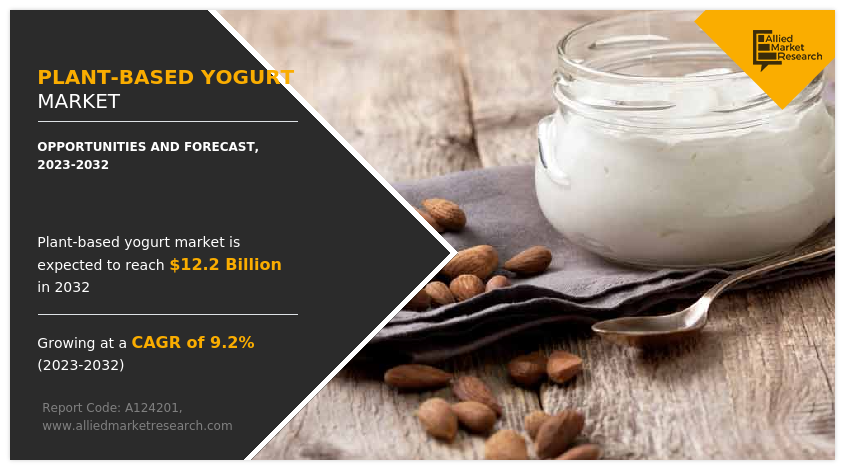
MARKET DYNAMICS
The plant-based food market has witnessed growth in recent years. The rise in the vegan population and lactose-intolerant population has pushed the growth of plant-based yogurt market. The medical condition of of lactose-intolerant individuals do not allow them to consume of animal-based products including dairy products. As a result, the demand for plant-based yogurt has surged as it is anticipated to be utilized as a dairy alternative. They restricted individuals from adopting any dairy products. The suffering individuals have trouble digesting lactose. The component 'lactose' found in dairy products is a sugar that is naturally found in milk and milk products and its malabsorption creates a condition where the small intestine cannot digest the consumed lactose. In addition, the various health benefits which comes with pant-based yogurt such as its low fat and cholesterol content, make it a popular choice among health and diet-conscious people. All the above-mentioned factors boost the demand for plant-based yogurt market as it has become a popular choice among diverse groups of consumers.
Globally, the large and small organizations have witnessed potential of the plant-based market. It has made made significant expenditures in R&D to produce new and superior plant-based yogurt. Moreover, the market expansion is being further fueled by many factors. The innovative products with improved flavor, texture, and nutritional profiles that have been found as a result of the increased investment in this sector. In addition, according to the comparison between plant-based and animal-based, plant based- food are more environment friendly which has altered customer tastes as they have shifted more toward plant-based solutions. Furthermore, several major businesses have increased the amount of plant-based yogurt in their product lineup to better serve a diverse customer base and successfully diversify their product line in order to compete for market share. Overall, a lot of businesses have made investments by collaborating with or purchasing established plant-based yogurt companies to gain access to knowledge, broaden distribution channels, and build consumer loyalty.
In comparison, plant-based yogurt is substantially more expensive than traditional dairy yogurt. The materials needed to make plant-based yogurt, which is more expensive than the milk used to make regular yogurt, include almonds, soy, coconut, and oats. Moreover, plant-based yogurt is produced on a large scale, it has expensive production expenses. Yogurt made from plants is a very complicated manufacturing process because it needs specific tools and methods. In addition, R&D funding is needed for the creation of yogurt made from plants. In comparison to dairy yogurts, which are susceptible to limited availability and high prices due to supply and demand dynamics, plant-based yogurt is more expensive.
Market expansion for plant-based yogurt is hampered by the inconsistent taste and texture. The various raw ingredients that go into making plant-based foundation yogurt include almonds, soy, coconut, oats, and seeds. The intrinsic qualities of plant-based yogurt provide the finished product with a variety of flavors and textures. Furthermore, manufacturers have faced trouble producing it with the same consistency as plant-based yogurt substitutes lack the dairy proteins that give normal yogurt its smooth and creamy texture. The texture and consistency of products are impacted by different production processes, including fermentation, temperature management, and the use of stabilizers.
The market for plant-based yogurt has a lot of potential due to technical advancements in the food processing sector to increase plant-based yogurt market share. Methods such as enzymatic processing, extrusion, and fermentation enhance the functionality and sensory characteristics of plant-based ingredients. Organizations have been able to optimize plant-based ingredients for improved taste, texture, as well as nutritional profiles. In conclusion, this results in yogurt products that are more appealing. In addition, innovations in homogenization, emulsification, and high-pressure processing (HPP) help in improving the creaminess, smoothness, and thickness of plant-based yogurt. Furthermore, methods including fractionation, enzymatic hydrolysis, and solvent-free extraction help to generate plant-based proteins. This raises usability, solubility, and nutritional profile, of the ingredients which raises the overall standard of the yogurt product.
SEGMENTAL OVERVIEW
The plant-based yogurt market is analyzed on the basis of raw material, flavor, distribution channel, and region. On the basis of raw material, the market is divided into soy, almond, coconut, and others. On the basis of flavor, the market is segregated into original/plain, vanilla, strawberry, blueberry, and others. On the basis of distribution channel, the market is categorized into supermarket/hypermarket, convenience store, specialty store, and online store. On the basis of region, the plant-based yogurt market is analyzed across North America (the U.S., Canada, and Mexico), Europe (the UK, Germany, France, Italy, Spain, Russia, and the rest of Europe), Asia-Pacific (China, Japan, India, Australia, and rest of Asia-Pacific), and LAMEA (Brazil, United Arab Emirates, South Africa, Saudi Arabia, and rest of LAMEA).
BY RAW MATERIAL
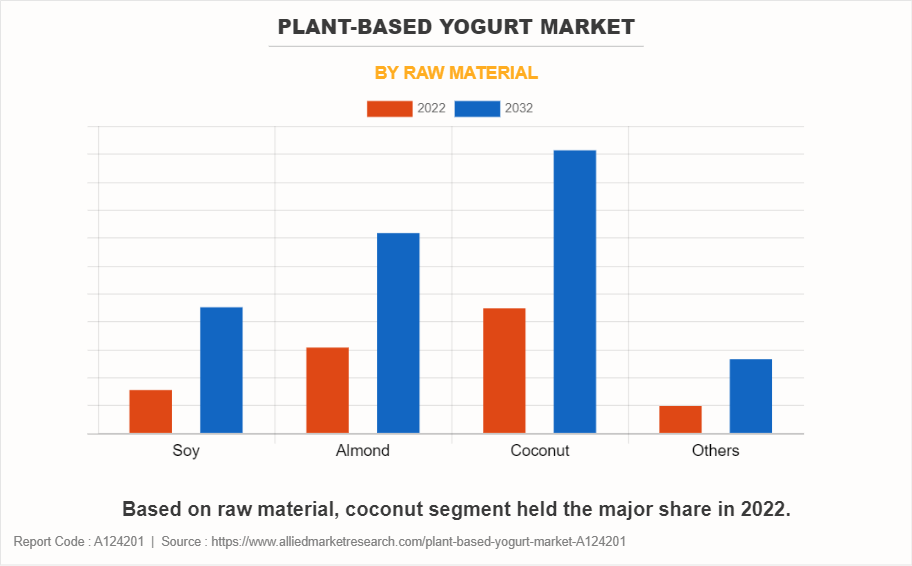
On the basis of raw material, the coconut segment dominated the plant-based yogurt market in 2022 and is anticipated to maintain its dominance throughout the forecast period. The rise in the number of health-conscious consumers who seek dairy-free diets has contributed to the expansion in demand for coconut-based yogurt alternatives. The plant based yogurt provides a dairy-free and allergen-friendly choice that fits with consumer dietary choices, increasing the plant-based yogurt market growth. Furthermore, the popularity of coconut yogurt has increased as it includes medium-chain triglycerides which are known for their potential health advantages. Thus, it has boosted demand for this segment as it is a natural and nutrient-rich good.
BY FLAVOR
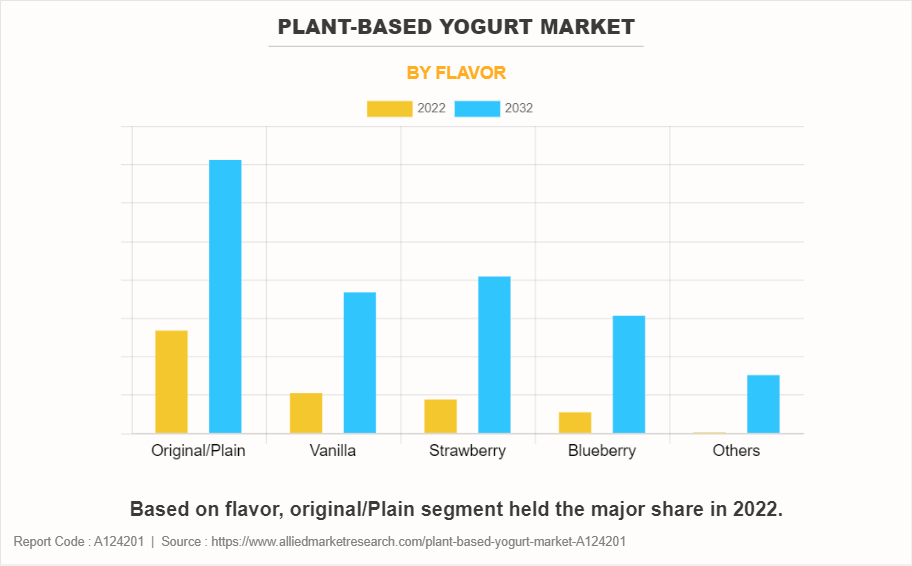
On the basis of flavor, the original/plain segment dominated the plant-based yogurt market in 2022 and is anticipated to maintain its dominance throughout the forecast period. The market for original/plain plant-based yogurt has grown remarkably in recent years. The demand for plant-based diets and products has expanded as a result of consumer focus on environmental awareness and health, making original/plain flavor plant-based yogurt a popular option for those looking for dairy substitutes. In addition, the consumer base for this market has grown as a result of the popularity of vegan and dairy-free lifestyles, which has increased the plant-based yogurt market demand. Manufacturers cater to a range of taste preferences while introducing a variety of goods in terms of taste by offering original/plain flavor plant-based yogurt. Furthermore, the nutritional value and improvements in taste and texture of plant-based yogurt make it appealing to consumers who are health aware.
BY DISTRIBUTION CHANNEL
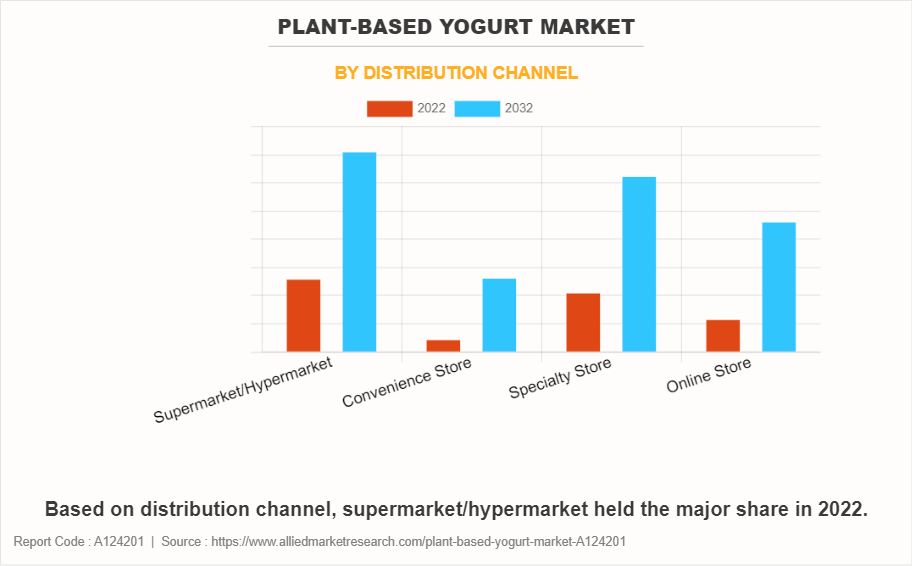
On the basis of distribution channel, the supermarket/hypermarket segment dominated the plant-based yogurt market in 2022 and is anticipated to maintain its dominance throughout plant-based yogurt market forecast period. Vegan and dairy-free products are majorly purchased in large retail formats such as supermarkets. Supermarkets are the main retail outlets for plant-based yogurt owing to their wide selection of plant-based products. The products being sold come from various brands and have various flavors. In supermarkets, plant-based yogurt is present in different flavors such as vanilla, strawberry, and blueberry along with others. The availability of different brands of plant-based yogurt products along with different packaging drives the growth of the segment significantly. Moreover, the health and dietary section has plant-based yogurt along with baking and cooking. In addition, the staff in supermarkets offer pertinent information about the goods, boosting sales through this distribution route. As a result, consumers find the market to be quite appealing because it gives them a way to complete their shopping at one location, saving them time.
BY REGION
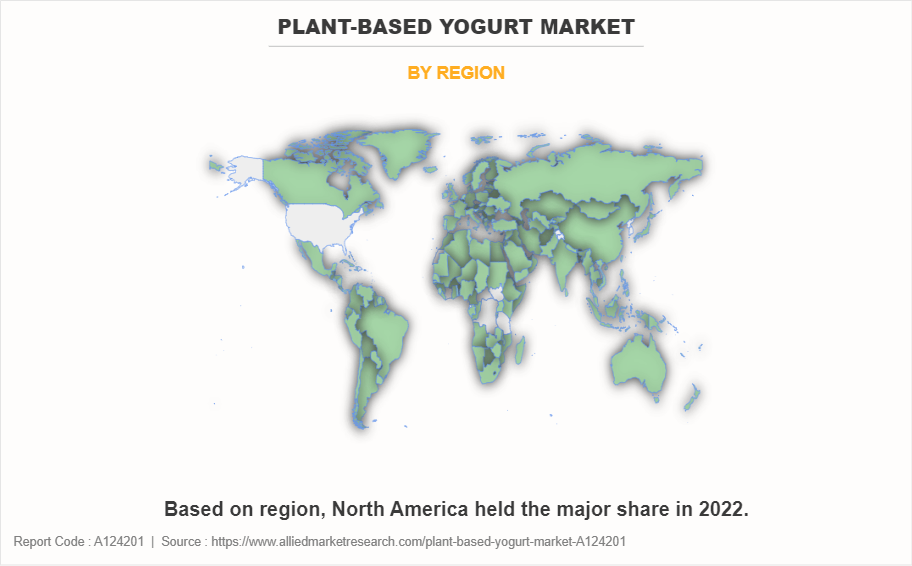
On the basis of region, North America is predicted to dominate the plant-based yogurt market size with the largest share during the forecast period (2023-2032). Plant-based yogurt sales have significantly increased owing to the continual expansion of the North America market. There has been a significant change in consumer behavior regarding the use of vegan and dairy-free products in the region. In addition, a rise in North American customers who use vegan items drives a considerable increase in demand for products of plant-based yogurt. Customers have become aware of the health advantages of utilizing plant-based yogurt, which has contributed to the rise in demand for dairy-free supplies. Moreover, the plant-based yogurt industry in this region has grown as a result of the increased penetration of retail and online retailers as well as social media marketing tactics.
COMPETITION ANALYSIS
The major players analyzed for the plant-based yogurt industry are Daiya Foods Inc., The Hain Celestial Group, Inc. Oatly Group AB, General Mills Inc., Kite Hill, Califia Farms, LLC, Springfield Creamery, Nush Foods, Danone S.A., and Forager Project.
Manufacturers of plant-based yogurt are always creating new products and formulae to satisfy the change in requirements of their customers. They make investments in R&D to create novel combinations of flavors with enhanced functionality, stability, and selectivity and create new applications for existing plant-based yogurt. Enhancing production methods, and navigating regulatory requirements, manufacturers of plant-based yogurt frequently work with vegan product producers, regulatory organizations, and other industry players while developing new products. Manufacturers are expected to increase their capacities, pool their knowledge, and create novel solutions through these collaborations.
Manufacturers have improved their production capacity and cost cutting, which are expected to involve both investing in new production facilities and renovating current ones to keep up with the rise in demand for plant-based yogurt. Furthermore, manufacturers of plant-based yogurt are anticipated to merge with or buy other businesses to broaden their product lines, get access to new markets or technologies, or do both at the same time. Manufacturers are expected to benefit from merging and acquiring businesses by expanding their product lines, gaining a larger plant-based yogurt market share, and enhancing their economies of scale.
The market for plant-based yogurt is anticipated to expand due to the rise in cooking and baking products demand, public knowledge of the advantages of vegan products, and the development of new and effective plant-based yogurt. In addition, factors such as innovation, collaboration, launching, and expansion are opportunistic for lant-based yogurt market growth.
Key Benefits For Stakeholders
- This report provides a quantitative analysis of the market segments, current trends, estimations, and dynamics of the plant-based yogurt market analysis from 2022 to 2032 to identify the prevailing plant-based yogurt market opportunities.
- The market research is offered along with information related to key drivers, restraints, and opportunities.
- Porter's five forces analysis highlights the potency of buyers and suppliers to enable stakeholders make profit-oriented business decisions and strengthen their supplier-buyer network.
- In-depth analysis of the plant-based yogurt market segmentation assists to determine the prevailing market opportunities.
- Major countries in each region are mapped according to their revenue contribution to the global market.
- Market player positioning facilitates benchmarking and provides a clear understanding of the present position of the market players.
- The report includes the analysis of the regional as well as global plant-based yogurt market trends, key players, market segments, application areas, and market growth strategies.
Plant-Based Yogurt Market Report Highlights
| Aspects | Details |
| Market Size By 2032 | USD 12.2 billion |
| Growth Rate | CAGR of 9.2% |
| Forecast period | 2022 - 2032 |
| Report Pages | 290 |
| By Flavor |
|
| By Distribution Channel |
|
| By Raw Material |
|
| By Region |
|
| Key Market Players | Springfield Creamery, Nush Foods, Kite Hill, General Mills Inc., Daiya Foods Inc., Oatly Group AB, Danone S.A., Califia Farms, LLC, Forager Project, The Hain Celestial Group, Inc. |
Analyst Review
The perspectives of the leading CXOs in the plant-based yogurt industry are presented in this section. The plant-based yogurt market is a dynamic and expanding segment of the global plant-based food industry. Moreover, bakery businesses enhance their products by using plant-based yogurt in their recipes for making dips, toppings, and baked items.
The CXOs further added that increased demand for vegan and dairy-free products, the popularity of diet-based products, and an increase in the need for lactose-free and clean-labeled products are propelling the market for plant-based yogurt. The demand for plant-based yogurt is further driven by shift in customer preferences and market dynamics, such as the effect of the COVID-19 pandemic on the plant-based food sector.??
? number of well-known players are active in the plant-based yogurt market, which is very competitive. Thus, companies are required to differentiate their products, cut prices, uphold high quality, and keep their consumers secure to succeed in this market. They need to focus on shifting customer tastes, shifting market dynamics, and change in regulatory frameworks related to the sales and distribution of food items around the globe.??
?
The global Plant-based Yogurt market size was valued at $5,043.3 million in 2022 and is projected to reach $12,200.4 million by 2032
The global Plant-Based Yogurt market is projected to grow at a compound annual growth rate of 9.2% from 2023 to 2032 $12,200.4 million by 2032
The major players analyzed for the plant-based yogurt industry are Daiya Foods Inc., The Hain Celestial Group, Inc. Oatly Group AB, General Mills Inc., Kite Hill, Califia Farms, LLC, Springfield Creamery, Nush Foods, Danone S.A., and Forager Project.
On the basis of region, North America is predicted to dominate the plant-based yogurt market size with the largest share during the forecast period (2023-2032).
Rise in vegan and lactose-intolerant population, Increase in investment and innovation by food companies, Rise in concern related to environmental sustainability
Loading Table Of Content...
Loading Research Methodology...



